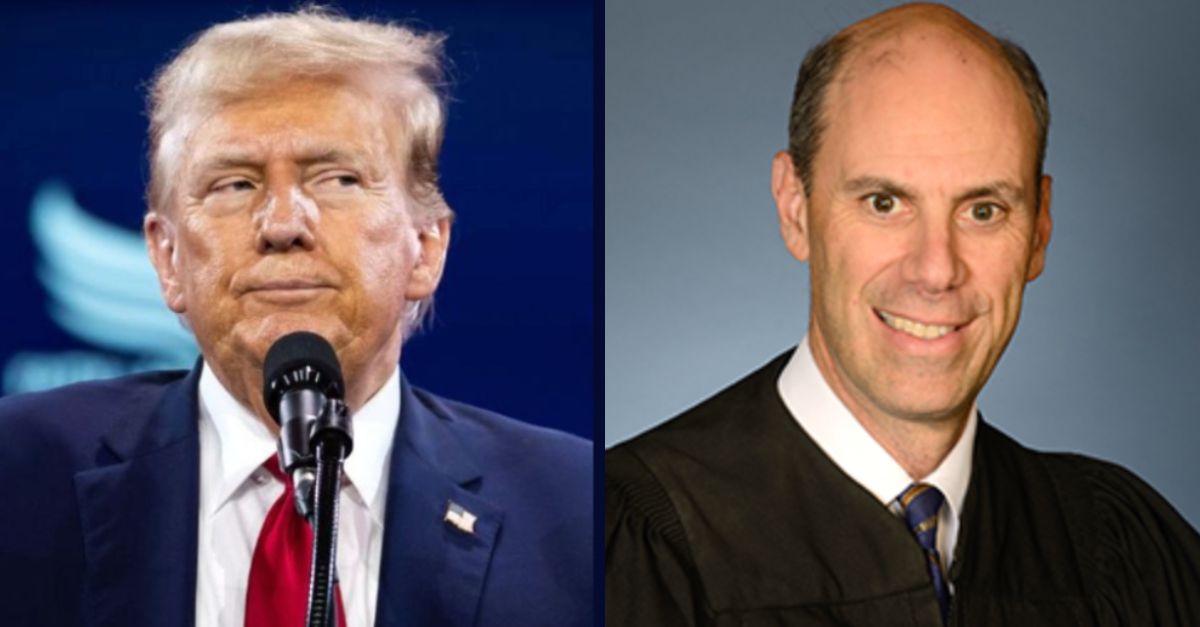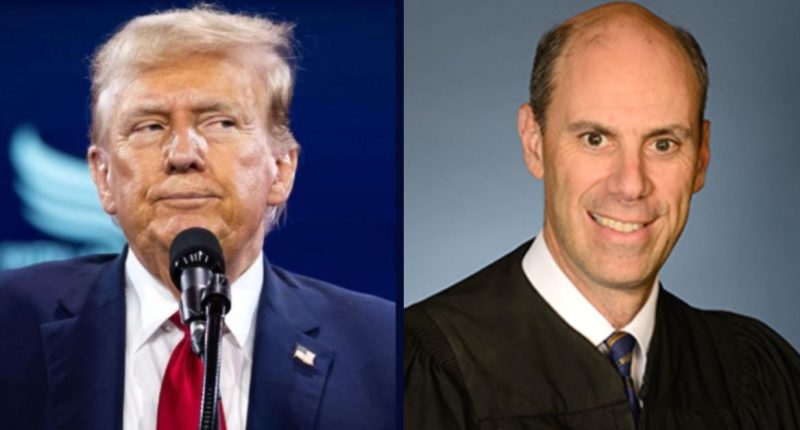
Left: Donald Trump speaks at the annual Road to Majority conference in Washington, DC, in June 2024 (Allison Bailey/NurPhoto via AP). Right: U.S. District Judge James Boasberg (U.S. District Court for the District of Columbia).
The Trump administration on Thursday doubled down on its claim that any migrants deported to El Salvador without due process under the Alien Enemies Act (AEA) were no longer in actual or constructive custody of the U.S. government — and therefore the government cannot “facilitate” their return to the country.
In a 49-page filing, the Justice Department defended President Donald Trump’s proclamation invoking the 18th-century wartime authority and argued that it could not return to the country those already deported under the AEA and that U.S. District Judge James Boasberg, of Washington, D.C., lacked jurisdiction to issue any ruling in the case in light of last month’s U.S. Supreme Court ruling that the case, as it was originally filed, did not belong the nation’s capital, but rather should have been filed where the detainees were being held.
“The President properly designated members of [Tren de Aragua] as alien enemies and terrorists in the Proclamation,” the filing states. “As a result, the government has been steadfastly attempting to remove them while fully complying with the law. Petitioners have responded by attempting to disrupt that lawful process by throwing theories at the wall and seeing what sticks.”
To support its claim that those already removed cannot be returned, the government filed a declaration from Deputy Secretary of State Christopher Landau in which he stated that El Salvador is an “independent nation” that “makes its own sovereign decisions, including with respect to detention.”
“It is undisputed that Petitioners in El Salvador are not actually within the United States’ physical custody,” the filing states. “The United States has no control over the actions of a foreign sovereign.” (emphasis in original)
Notably, Trump in an interview with ABC News over the weekend said that he “could” have individuals released from El Salvador with a single phone call, then said he was “not the one” who makes those decisions.
Love true crime? Sign up for our newsletter, The Law&Crime Docket, to get the latest real-life crime stories delivered right to your inbox.
The Supreme Court on April 7 appeared to have ended the AEA case before Boasberg when it held that the plaintiffs — five Venezuelan migrants who were set to be deported to El Salvador — had to bring their claims as habeas petitions, which are challenges to the legality of an individual’s detainment, in the jurisdictions where they were being held.
But the ACLU, which is representing the plaintiffs, sought to keep the matter before Boasberg in Washington, D.C., by amending the complaint to include habeas claims on behalf of the 137 individuals already deported to El Salvador, claiming the federal government — itself located in the District of Columbia — maintained “constructive custody” over them.
The Supreme Court’s April 7 ruling also unanimously held that those migrants subject to removal under the AEA must be afforded notice “within a reasonable time and in such a manner” to allow those detainees “to actually seek habeas relief in the proper venue before such removal occurs.” Based on that holding, the plaintiffs argued that Boasberg maintained jurisdiction over non-habeas aspects of the case, including ensuring that any migrants subject to removal under the AEA were provided adequate notice of their potential deportation.
The Trump administration on Thursday argued that the plaintiffs’ latest request — which seeks to facilitate the return of those already deported to El Salvador and to halt future removals under the AEA — was a direct challenge to the high court’s ruling.
“In defiance of the Supreme Court’s decision, Petitioners persist in their efforts to anchor this habeas litigation outside the jurisdiction of confinement,” the Justice Department wrote.
The government went on to claim that any individual already removed to El Salvador could not be returned to the country as they were formally out of U.S. custody.
“Petitioners’ first innovation to get around the Supreme Court’s ruling is to argue that the United States has ‘custody’ of prisoners held in the territory of — and by agents of — a separate, sovereign nation,” the filing states. “That is not the case. There is no basis on which Petitioners can claim that the United States exercises plenary, indefinite control over El Salvador. To the extent the United States and El Salvador made a bilateral arrangement, it is not an enforceable agreement providing that the United States can obtain or retain control over aliens imprisoned on Salvadoran soil by Salvadoran guards.”
While Boasberg on March 15 became the first judge to halt removals under the AEA, the Supreme Court subsequently vacated his temporary restraining order.
The plaintiffs in the case have already filed habeas petitions in the jurisdictions where the individual defendants are being held, but asserted that Boasberg still has jurisdiction over plaintiffs’ claims regarding whether a detainee is provided adequate notice to file a habeas petition in the jurisdiction of their detainment.
“That is because Plaintiffs’ notice claims lie outside of habeas. As the Supreme Court recognized, notice is a necessary precondition for ensuring that individuals can seek judicial review, and on that basis it affirmed Plaintiffs’ due process claim on the merits in this action,” plaintiffs wrote in their request for a preliminary injunction. “The Supreme Court’s ruling did not require such notice claims to be brought in habeas; to the contrary, it recognized that adequate notice is necessary to effectuate habeas review under the AEA”
Boasberg last month also found probable cause to hold the Trump administration in criminal contempt for ignoring his order to have the planes carrying the 137 migrants returned to the U.S. before they landed. The administration has denied flouting the court order, arguing the planes were outside of U.S. airspace at the time the directive was given. That controversy remains ongoing.
The government’s opposition motion was filed just hours after a Donald Trump-appointed judge in Texas ruled on the merits for the first time that the administration’s deportations under the AEA were “unlawful.”







